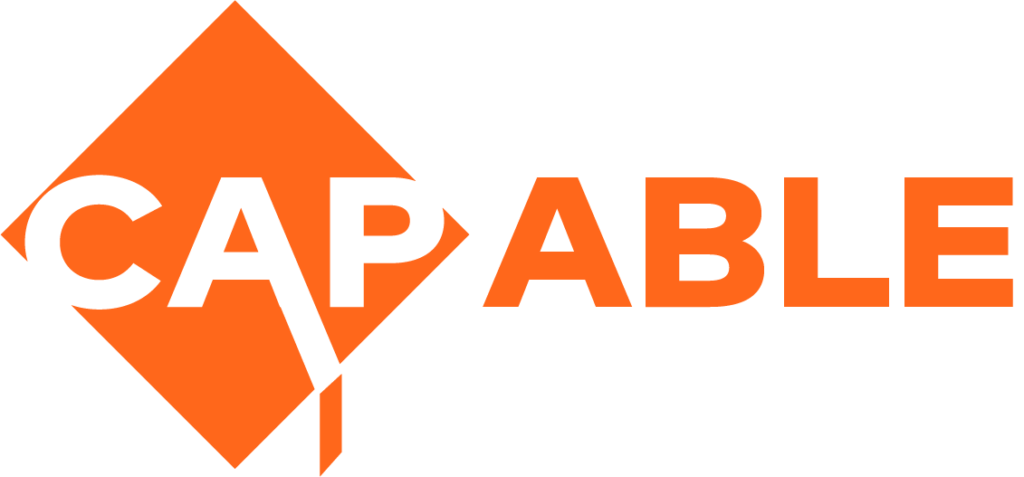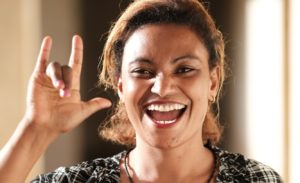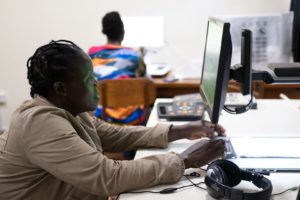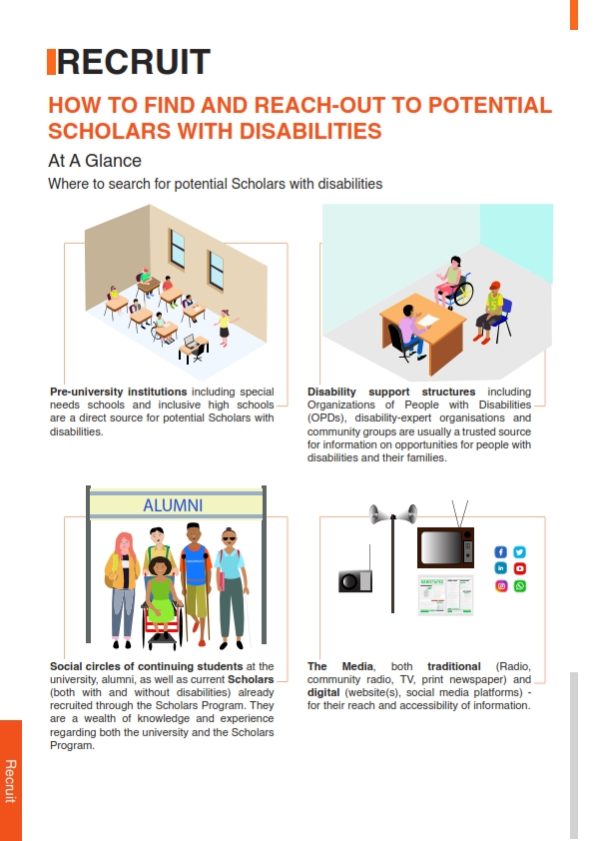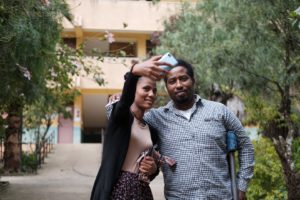
Recruit
What Can You Find in this Section?
Statistical data on students with disabilities recruited annually into higher education institutions on the African continent is not readily available due to limited literature in this realm.
While attitudinal, environmental and other societal barriers faced by people with disabilities continue to limit their representation in higher education, the belief that there are not enough young people with disabilities to recruit potential Mastercard Foundation Scholars from, is simply not true.
Due to the efforts made by governments and other non-governmental organisations over the past decades, more young people with disabilities are accessing secondary and higher education than ever before. pre-university and education.
However, recruiting Mastercard Foundation Scholars with disabilities, more often than not, will require an additional effort from the Program, the institution and its other partners. A lot of this comes down to deliberate mobilisation strategies and inclusive recruitment practices.
AT A GLANCE: How to Find and Reach-Out to Potential Mastercard Foundation Scholars with Disabilities
Where to search for potential Mastercard Founation Scholars with disabilities
- Pre-university institutions including special needs schools and inclusive high schools are a direct source for potential Mastercard Foundation Scholars with disabilities.
- Disability support structures including Organizations of People with Disabilities (OPDs), disability-expert organisations and community groups are usually a trusted source for information on opportunities for people with disabilities and their families.
- Social circles of continuing students at the university, alumni, as well as current Mastercard FOundation Scholars (both with and without disabilities) already recruited through the Program. They are a wealth of knowledge and experience regarding both the university and the Program.
- The Media, both traditional (Radio, community radio, TV, print newspaper) and digital (website(s), social media platforms) – for their reach and accessibility of information.
How to search for potential Mastercard Founation Scholars with disabilities
- Use your existing partnerships and/or Internet search to find contacts to disability support structures in a particular area, region and/or country. A number of larger disability support structures now have a presence on the internet though a website, directory and/or social media pages. If your institution already partners with some disability support structures, use them as a source and link to others in their networks.
- Snowball searching. Identify a few disability support structures, community/youth groups or pre-university institutions and use them to spread information to others in their networks.
- Organize regular outreach programs and/or information sessions to grow interest in the Scholars Program and channel applications through.
- Spread the word far and wide using alternative formats (audio, video, easy-reads) for your call for applications. These increase coverage, reach of information and accessibility for people with different types of impairments.
- Have Liaisons/ Contact people on hand to provide further information about the Program, relay information on the recruitment process, requirements, and support provided to successful finalists with disabilities in the Program.
How to Find and Reach-Out to Potential Mastercard Foundation Scholars with Disabilities
Leverage the High School-to-University Pipeline
Pre-university institutions including special needs schools and inclusive high schools are a direct source for potential Mastercard Foundation Scholars with disabilities. These institutions can play an essential role in not only providing information about the Mastercard Foundation Scholars Program but also assisting their students with disabilities in the application process. Their experiences with students with disabilities can provide useful insight into what accommodations are needed in the Program to enable their full and active participation.
“I saw the application announcement poster posted in my high school. I saved the contact information, and I called her after I received my 12-grade national examination result. She told me about the Mastercard Foundation Program and where I could find the application from.”
Mastercard Foundation Scholar, physical impairment, University of Gondar
Engage Disability Support Structures and Networks
Disability support structures are usually a trusted source for information on opportunities for community members with disabilities and their families. Information coming from these structures is more likely to reach networks of people with disabilities, also enabling spread of information through word of mouth within this particular demographic.
Engaging structures such as Organisations of People with Disabilities (OPDs), local disability groups including community based organisations and self-help groups, and Disability-Specific/Expert organisations works to support various elements of a disability inclusive Mastercard Foundation Scholars Program: they are a useful resource in promoting the Program within their networks; supporting the recruitment of Mastercard Foundation Scholars with disabilities; offering recommendations for service providers (such as sign language interpreters, providers of assistive devices, assistive technology, etc.) and; providing expertise on disability inclusion (including trainings and practical guidance on inclusive recruitment strategies).
Get Current Scholars, University Students, and Alumni Involved
Continuing students at the university, alumni, as well as Mastercard Foundation Scholars (both with and without disabilities) already recruited through the Program are a wealth of knowledge and experience regarding both the university and the Program. Utilizing them (and their social networks) will allow the spread of information about the Program to potential applicants.
“A friend and a senior student here at University of Gondar who is from my hometown told me about the program and brought the application form for me.”
Mastercard Foundaation Scholar, hearing impairment, University of Gondar.
Use Diverse Media
Ideally, a combination of traditional media (Radio, community radio, TV, print newspaper) and digital (website(s), social media platforms) as well as availing information about the Mastercard Foundation Scholars Program in various formats (audio, video, easyread documents) increases accessibility for potential applicants with disabilities and ensures wide reach of information, in both urban and rural communities.
AT A GLANCE: How to run a disability inclusive recruitment process
- Avail a contact person(s) or liaisons for any extra support during the application/ recruitment process.
- Affirm the university’s and Mastercard Foundation Scholars Program’s commitment to disability inclusion through including statements in the advert such as “people with disabilities are encouraged to apply”, “we are a disability committed institution/Program”, and others.
- Have a supplementary “Frequently Asked Questions” document to answer disability-related queries.
- Raise disability awareness among recruitment staff, where they feel confident to engage with a prospective Scholar with a disability and run an inclusive recruitment process.
- Provide reasonable accommodation during recruitment
How to run a disability inclusive recruitment process
Have liaisons/ contact persons to support the recruitment process
Avail a contact person(s) or liaisons for any extra support during the application/ recruitment process. Such contact persons do not have to be Mastercard Foundation Scholars Program staff. Representatives from Education Bureaus and disability structures, teachers and administrators at pre-university educational institutions as well as other community leaders/members can be trained for the role. These contact persons could prove valuable in relaying information during the application process in a manner that a potential applicant may understand better where the need arises.
Having liaisons in other regions of the country and other focus countries who have detailed information about the Program, have access to application forms and communicate with applicants should queries arise during the process, may realize an increase in applicants from other regions of the country and other focus countries of the Program.
Affirm the university’s and Mastercard Foundation Scholars Program's commitment to disability inclusion in recruitment
Social exclusion and other barriers faced by people with disabilities throughout their lives leave an impact on their self-esteem and often leads to self-exclusion; where people with disabilities choose not to take up/apply for an opportunity even those they stand to greatly benefit from.
Statements such as “people with disabilities are encouraged to apply”, “we are a disability committed institution”, and such, reiterate a university’s and/or Scholars Program stance on disability inclusion and provide a subtle reassurance to a prospective student with a disability to take the chance and apply.
Have a supplementary "Frequently Asked Questions" document to answer disability-related queries
The ability to sufficiently answer queries/concerns related to support given to students with disabilities at the institution and within the Mastercard Foundation Scholars Program goes a long way in prompting prospective Mastercard Foundation Scholars with disabilities to apply.
This can be done through developing a “Frequently Asked Questions” information document and/or Disability Support Information Tab on the institution’s website, complete with contact information for the disability inclusion focal person or designated department for disability affairs.
Raising disability awareness among recruitment staff
Recruitment staff need to feel confident about engaging with prospective scholars with different types of impairments, especially if they have had limited interaction and/or exposure to people with disabilities. Having a disability awareness training for recruitment staff zooming in on:
- the basics of disability and inclusion;
- types of impairments and their diversity (including screening procedures);
- respectful language;
- practical tips on how to communicate and engage people with different types of impairments, as well as;
- inclusive recruitment strategies.
This training and guidance will enable a comfortable, equitable and effective recruitment process for Mastercard Foundation Scholars with disabilities.
Providing reasonable accommodation during interviews/admission process
Reasonable accommodation provided during the interview or admission process could range from alternative methods offered for online and oral interviews to other provisions to enable applicants with disabilities to adequately participate in the admission process.
Alternatives for online and oral interviews
The COVID-19 pandemic has, among other considerations, led to the adaptation of online or remote interviews and admission processes. These may present a number of opportunities for disability inclusion; for example, negating the barriers faced by those with physical impairments in accessing in-person interviews but also create challenges for those in locations with internet connectivity challenges, and those with limited access to technology, let alone assistive technology.
Having alternative methods of interviewing such as online interviews, phone interviews, or offering the option to write out responses to some questions in addition or as an alternative to the oral interview.
Provisions to enable participation in interviews
These provisions may differ depending on the type of impairment of the applicant, severity of impairment and preferences. Please refer to the reasonable accommodation guide to learn more about provisions for different types of impairments.
Related Articles
Other Links
RECEIVE OUR UPDATES
- →
-
Chat with Us!
Do you have a comment, suggestion, question or request for more information? Let us know!
